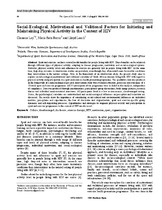| dc.contributor.author | Ley, Clemens | |
| dc.contributor.author | Barrio, María Rato | |
| dc.contributor.author | Leach, Lloyd | |
| dc.date.accessioned | 2017-03-31T08:38:09Z | |
| dc.date.available | 2017-03-31T08:38:09Z | |
| dc.date.issued | 2015 | |
| dc.identifier.citation | Ley, C. et al. (2015). Social-ecological, motivational and volitional factors for initiating and maintaining physical activity in the context of HIV. Open AIDS Journal, 9: 96 - 103 | en_US |
| dc.identifier.issn | 1874-3218 | |
| dc.identifier.uri | http://hdl.handle.net/10566/2708 | |
| dc.identifier.uri | http://dx.doi.org/10.2174/1874613601509010096 | |
| dc.description.abstract | Sport and exercise can have several health benefits for people living with HIV. These benefits can be achieved through different types of physical activity, adapting to disease progression, motivation and social-ecological options. However, physical activity levels and adherence to exercise are generally low in people living with HIV. At the same time, high drop-out rates in intervention studies are prevalent; even though they often entail more favourable conditions than interventions in the natural settings. Thus, in the framework of an intervention study, the present study aims to explore social-ecological, motivational and volitional correlates of South African women living with HIV with regard to physical activity and participation in a sport and exercise health promotion programme. The qualitative data was produced in the framework of a non-randomised pre-post intervention study that evaluated structure, processes and outcomes of a 10-week sport and exercise programme. All 25 participants of the programme were included in this analysis, independent of compliance. Data was produced through questionnaires, participatory group discussions, body image pictures, research diaries and individual semi-structured interviews. All participants lived in a low socioeconomic, disadvantaged setting. Hence, the psychological correlates are contextualised and social-ecological influences on perception and behaviour are discussed. The results show the importance of considering social-cultural and environmental influences on individual motives, perceptions and expectancies, the fear of disclosure and stigmatisation, sport and exercise-specific group dynamics and self-supporting processes. Opportunities and strategies to augment physical activity and participation in sport and exercise programmes in the context of HIV are discussed. | en_US |
| dc.language.iso | en | en_US |
| dc.publisher | Bentham Science Publishers B.V. | en_US |
| dc.rights | Open-Access License: This is an open access article licensed under the terms of the Creative Commons Attribution Non-Commercial License (http://creativecommons.org/licenses/by-nc/3.0/) which permits unrestricted, non-commercial use, distribution and reproduction in any medium, provided the work is properly cited. | |
| dc.subject | Culture | en_US |
| dc.subject | Disadvantaged | en_US |
| dc.subject | Disclosure | en_US |
| dc.subject | Exercise therapy | en_US |
| dc.subject | HIV | en_US |
| dc.subject | Motivation | en_US |
| dc.subject | Sport | en_US |
| dc.subject | Stigmatisation | en_US |
| dc.title | Social-ecological, motivational and volitional factors for initiating and maintaining physical activity in the context of HIV | en_US |
| dc.type | Article | en_US |
| dc.privacy.showsubmitter | FALSE | |
| dc.status.ispeerreviewed | TRUE | |
| dc.description.accreditation | Scopus | en_US |

